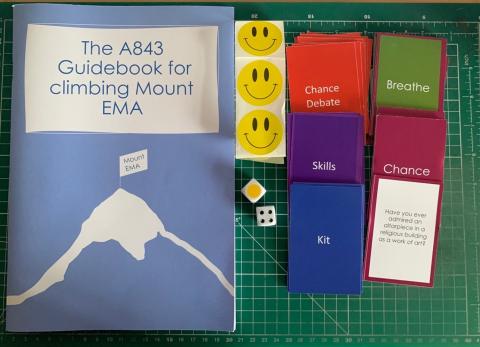You are here
- Home
- ‘The Project Game: Is My Topic EMA Material?’
‘The Project Game: Is My Topic EMA Material?’
- Project Team: Renate DohmenGeorgina HoldenPamela Bracewell-HomerGeorgina Holden
- Subject Discipline: Arts and Humanities
- Theme: AssessmentMultisensory/multimodal learning
- Project Aim: Enables more students to achieve their study goalsImproves and enhance the learning experience of studentsPromotes equality diversity and inclusion including reduction of degree awarding gap
- Status: Complete
- Date: August 2020 to October 2021

This project aimed at first year students on the MA in Art History (A843) supporting them in their preparation for their assignment, the 3,000-word final assignment for A843, with a focus on helping them identify a suitable topic that allows for a successful discussion. It applies game-based problem-solving strategies prevalent in the discipline of design, testing the scope, feasibility and soundness of such an approach for this post-graduate module in art history and, by implication, for the Humanities in general.
Students faced with choosing projects for their graduate level end-of-first-year assignment/dissertation often encounter problems if they make poor choices early on in their project work, and these problems may be compounded by subsequent poor decision making. The purpose of this scholarship project is to improve students’ ability to choose and devise suitable graduate level, self-directed projects with a view to increasing student success. Specifically, the project sought to adopt an innovative approach to the development of materials drawing on gamified approaches to problem solving that feature in teaching materials of Open University courses in design such as U101. It sought to explore how the skills required for successful, post-graduate level project work in the Humanities, such as an end-of-module dissertation, can be taught through a more playful approach to guidance and ideas development. A key objective was to establish whether a game that facilitates student learning through serious play can help students understand the consequences of decision-making for their own project work. The researchers also sought to ascertain the benefit of this approach across levels of ability.
This first phase of the project has developed a prototype ‘guidebook' and accompanying set of cards that support students as they go through their decision-making process. It entails a mix of examples, prompts, invitations for reflection and self-awareness about learning styles as well as gamified elements that introduce breaks, chance elements and instructions for playing an associated game as well as a section that tests requisite skills and prompts their development.
The project examined student perceptions of this approach. It sought to ascertain whether students see value in this different way of learning and whether they feel it is helpful in their process of evaluation and decision-making. Measures of success for the project included student satisfaction and progression as well as learning analytics and tutor feedback and assessment. However, the initial pilot sample was small and further work is needed to develop the full potential of the approach. A further, future objective is to develop the game for wider use, which may include third level courses as well as other PG modules across FASS and beyond. It could also potentially be developed into an online interactive game.
